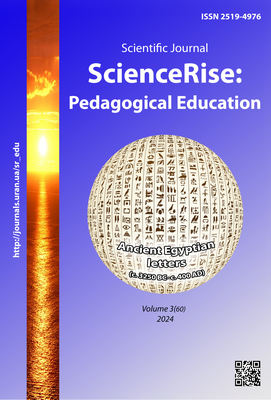Preparation of future natural science teachers for the use of digital educational resources during teaching
DOI:
https://doi.org/10.15587/2519-4984.2024.311660Keywords:
digital educational resources, learning, innovations, teaching of natural sciences, training of future teachers, teacher training, pedagogical experienceAbstract
The article examines the complex aspects of training future teachers of natural sciences to use digital educational resources in the educational process, which is an actual topic of modern pedagogy. Development of pedagogical knowledge, as well as cooperation with scientific institutions and scientists are key components of successful training.
The article examines in detail the support of teachers from scientists, the integration of science with other disciplines, and the formation of a positive attitude toward science among students. The importance of the development of scientific thinking, the creation of educational materials, the use of digital educational resources, the formation of professional qualities and the use of an interdisciplinary approach for the training of future teachers of natural sciences is emphasized.
The main challenges, such as technological barriers and insufficient funding, which can prevent the use of digital educational resources in the educational process, are highlighted. An important aspect is also professional development and support for innovation in education, which allows teachers to constantly improve their knowledge and skills using the latest technologies and methods.
Thus, the preparation of future teachers of natural sciences to use digital educational resources is a multifaceted process that includes the development of pedagogical knowledge, support of scientists, integration of science with other disciplines, development of professional qualities and use of modern technologies. Providing teachers with the necessary support and resources contributes to the successful implementation of these approaches, increasing the quality of education and student interest in natural disciplines.
The importance of the participation of scientists in the development of educational programs that integrate various scientific disciplines and emphasize the practical application of knowledge is emphasized. Restructuring of primary and secondary school curricula, as well as optimal professional development formats, are important aspects of improving the quality of teaching. Evaluation of educational programs shows the need for changes in content education and pedagogy.
The support of teachers from scientists, the integration of science with other disciplines and the formation of a positive attitude towards science among students are considered. The development of competencies, including scientific thinking, the creation of teaching materials, the use of digital resources and an interdisciplinary approach, are key to the preparation of future teachers. Challenges, such as technological barriers and insufficient funding, are discussed, as well as prospects for improving skills and supporting innovation in education.
The article provides a comprehensive overview of the preparation of future natural science teachers to use digital educational resources and highlights important aspects of this process with an emphasis on teacher support and development of their competencies
References
- Abell, S. K., Rogers, M. A. P., Hanuscin, D. L., Lee, M. H., & Gagnon, M. J. (2009). Preparing the Next Generation of Science Teacher Educators: A Model for Developing PCK for Teaching Science Teachers. Journal of Science Teacher Education, 20 (1), 77–93. https://doi.org/10.1007/s10972-008-9115-6
- Slater, T. F., Tomanek, D., Talanquer, V., Novodvorsky, I. (2003). A Stronger Role for Science Departments in the Preparation of Future Chemistry Teachers. Journal of Chemical Education, 80 (10), 1168. https://doi.org/10.1021/ed080p1168
- Howitt (2008). The Collaborative Science project: preparing pre-service early childhood teachers to teach science.
- Demkanin, P. (2013). Preparation of new physics teachers from various perspectives. Journal of Baltic Science Education, 12 (1), 4–5. https://doi.org/10.33225/jbse/13.12.04
- Crosby, G. (1997). The Necessary Role of Scientists in the Education of Elementary Teachers. Journal of Chemical Education, 74 (3), 271. https://doi.org/10.1021/ed074p271
- Vaidya, S. R. (1993). Restructuring Elementary and Middle School Science for Improved Teaching and Learning. Education, 114, 63–70.
- Tushie, J. (2009). Working with Elementary and Middle School Science Teachers.
- Sebastián-López, M., de Miguel González, R. (2020). Mobile Learning for Sustainable Development and Environmental Teacher Education. Sustainability, 12 (22), 9757. https://doi.org/10.3390/su12229757
- DeVore-Wedding, B., Thomas, J., Montgomery, D. (2018). Determining Optimal Professional Development Formats: A Q-Methodology Study of Science Teachers’ Preferences. Operant Subjectivity, 40. https://doi.org/10.22488/okstate.18.100572
- Shim, K. C. (2017). A Study on the Awareness of Pre-service Science Teachers about Secondary Education in Future Intelligence Information Society. Biology Education, 45 (3), 404–417. https://dx.doi.org/10.15717/bioedu.2017.45.3.404
- Bradbury, L. U., Wilson, R. E. (2020). Questioning the prevailing narrative about elementary science teachers: An analysis of the experiences of science teacher enthusiasts. Science Education, 104 (3), 421–445.. https://doi.org/10.1002/sce.21574
- Torrente Díaz, M. T., Guevara, W. A., Echeverry Hernández, S., Amórtegui Cedeño, E. F. (2014). Enseñanza de competencias de pensamiento científico por resolución de situaciones problematizadoras a futuros docentes de ciencias naturales. Revista Bio-Grafía Escritos Sobre La Biología y Su Enseñanza, 885. https://doi.org/10.17227/20271034.vol.0num.0bio-grafia885.894
- Malik, A., Susanti, S. (2021). Learning Designing for Establishment Physics Content and Teacher Pedagogic Aspects Through Lesson Study-based In-House Training. Jurnal Penelitian & Pengembangan Pendidikan Fisika, 7 (2), 145–152. https://doi.org/10.21009/1.07206
Downloads
Published
How to Cite
Issue
Section
License
Copyright (c) 2024 Olena Matviienko

This work is licensed under a Creative Commons Attribution 4.0 International License.
Our journal abides by the Creative Commons CC BY copyright rights and permissions for open access journals.
Authors, who are published in this journal, agree to the following conditions:
1. The authors reserve the right to authorship of the work and pass the first publication right of this work to the journal under the terms of a Creative Commons CC BY, which allows others to freely distribute the published research with the obligatory reference to the authors of the original work and the first publication of the work in this journal.
2. The authors have the right to conclude separate supplement agreements that relate to non-exclusive work distribution in the form in which it has been published by the journal (for example, to upload the work to the online storage of the journal or publish it as part of a monograph), provided that the reference to the first publication of the work in this journal is included.








